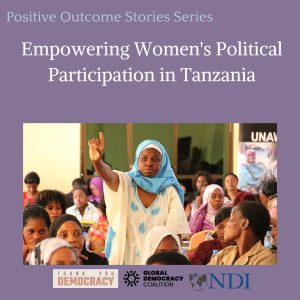National Democratic Institute (NDI) Positive Outcome Story: Empowering Women’s Political Participation in Tanzania

Despite constituting half of the population, women in Tanzania are significantly underrepresented in public office and political party leadership at both the local and national levels. In 2020, only 26 women were elected to parliament out of 264 seats, and women comprised only nine percent of candidates for president, parliament, and councilorships.
NDI has worked with the Women in Politics (WiP) parliamentary group and organizations like Omuka Hub for years to advocate for and build consensus around electoral reform and legal amendments to facilitate the political inclusion of women. The Institute has been able to facilitate engagements that have given partners the opportunity to continuously refine reform recommendations, which have been taken up by champions in parliament and government agencies. One of these pivotal engagements was the Women in Politics Forum held in Bukoba last October which convened representatives from diverse backgrounds, including civil society organizations, women and youth groups, faith-based leaders, and regional and ward leaders. The forum allowed these groups to build consensus on specific reform priorities for amending gender inclusion policies that are currently vague, non-binding, and hard to enforce. They developed recommendations for legislators, which include creating mechanisms to tackle violence against women, creating a gender desk in political parties to recognize and address complaints.
In February 2024, amendments that included key recommendations from NDI partners passed through the Tanzanian legislature. This resulted in new protections within Tanzanian elections law that penalize Violence Against Women in Elections, making Tanzania the first country in the African continent to do so. It is now listed as an electoral offense with codified consequences, political parties are mandated to have social inclusion policies on gender and disability issues, and all political parties are required to have gender desks to process complaints on violence against women. Although not all the recommendations were adopted into law, this marks a step towards addressing the barriers women face in political parties and in elections.
Quotes from Honorable Neema Lugangira, Chair of the Women in Politics Parliamentary Group, United Republic of Tanzania:
Experiences on the treatment of women in parliament.
“A comfortable excuse that many political parties tend to use is that ‘women are not there; that women don’t come forward to vie [for elected seats] in parliament’… One of the strongest hindrances to women going for elected seats is the gender-based violence that is subjected to women during elections… It has almost been accepted that as a woman in politics, you should have thick skin to accept everything that is thrown at you.”
NDI worked collaboratively with CSOs and champions in parliament to build consensus on women’s issues and drive advocacy for legal reform.
“Generally, we tend to have a perception that when a donor or international organization is providing support to a country, it is prescriptive… and comes to members of parliament with a prescribed solution… To the contrary, our relationship and partnership with NDI is the complete opposite… [NDI was] responding to our needs rather than telling us what we need, which was enriching. I think that is why we were able to get the consensus… within our group.”
